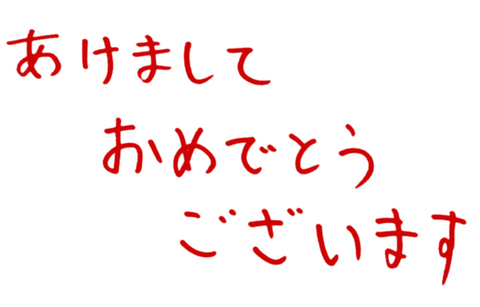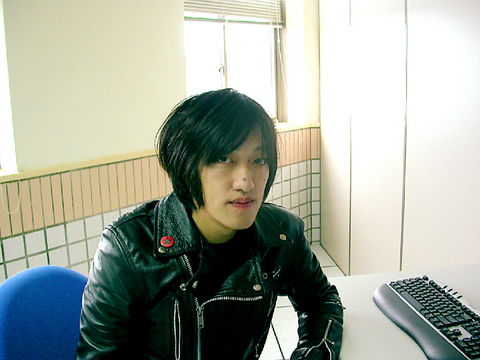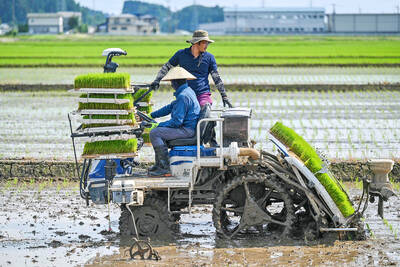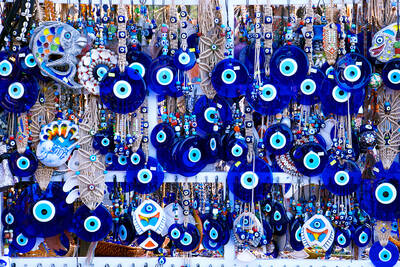Yesterday, Celebrating New Year's the World Over introduced some of the customs family reunions in Muslim and Catholic countries. Today, a Japanese student studying Chinese at Zhengzhi University named Hua Si-meng will help us understand the Japanese tradition of ringing a temple bell at New Year's. We'll also find out why Germans can't miss watching a comedy sketch called Dinner for One every New Year's.
世界嘉年華昨天介紹了回教和天主教國家團圓的禮俗,今天透過目前於政治大學研習中文,來自日本的挽野玄和德國的畢思蒙,了解日本敲擊廟鐘跨年及德國人每逢新年必看「一個人的晚餐」這部喜劇小品的傳統。
Hikino Gen, who has been in Taiwan for two years, remembers his New Year last year. He spent a lonely day hanging out in McDonalds and Burger King by himself reading books, then at night he went to the international students' dorm to drink with other classmates who were feeling a long way from home. He casually remarked, ``When you compare the New Year in Taiwan, with its festive atmosphere and the sound of firecrackers everywhere, to Japan's New Year (on Jan. 1 of the Western calendar), of course the atmosphere in Japan seems very subdued. However, Japan's TV programs are better than Taiwan's. The whole family gets together to watch Red versus White Singing Contest (red represents the women, white the men).'' After they finish watching the show, he and his family go to a nearby temple to line up and bang the bell to drive away evil. Each person gets to ring the bell just once, and the ceremony ends when the bell has been rung for the 108th time. Aside from this, they also eat soba, black beans and kelp as their way of getting pumped up for the New Year (In Japan, black beans symbolize hard work, and kelp symbolizes happiness because their pronounciations are similar). However, more and more Japanese are acting like the Taiwanese: They party too hard on New Year's eve, and then on New Year's day they stay home and sleep it off.

PHOTO: CHENG HSIANG-YI, TAIPEI TIMES
來台灣兩年的挽野玄回憶,去年在台灣過年時,白天一個人冷清地泡在台北空城的麥當勞和漢堡王看書,晚上和同是天涯淪落人的外籍同學在國際學生宿舍喝酒。不過他卻很自在地說:「相較於台灣到處鞭炮聲的熱鬧新年,日本(西曆一月一日)過節的氣氛本來就安靜許多,不過新年節目比台灣好看,十二月三十一日晚上的「紅白歌和戰」(紅代表女方,白代表男方)是闔家必看的節目。」節目欣賞完後,他和家人會一起到附近的廟宇排隊敲鐘,驅邪避凶,排隊的民眾一人只能敲一次,如此進行到鐘響一百零八次為止。除此之外,蕎麥麵、黑豆和海帶(黑豆的日文諧音是勤勉,而海帶則是開心的意思)為自己在新年加油打氣,不過,有愈來愈多的日本人跟台灣人一樣,除夕夜玩太瘋,初一就在家裡倒頭呼呼大睡。
--Translated by Marc Langer 藍孟翔翻譯

PHOTO: CHENG HSIANG-YI, TAIPEI TIMES

Rice is essential to Japanese culture, tradition and politics. People take pride in the oval-shaped sticky Japonica grain, which is still a staple even though total consumption has fallen over the decades. But since last summer, prices have soared as supplies have fallen short of demand. The government has long paid farmers to cut back on rice acreage, and change to other crops to keep rice prices relatively high. To cope with shortfalls this year, the government has released rice reserves. But the grain has been slow to reach supermarket shelves. Anger over that was part of the reason the Agriculture Minister

In Taiwan, 7-Eleven convenience stores can be found on almost every street corner. With over 84,600 stores across 20 countries, 7-Eleven has more locations than any other retail business on Earth. For millions of people, the chain is an important part of daily life, providing coffee, quick meals, and essential items for those __1__. The history of 7-Eleven began nearly 100 years ago in Dallas, Texas. In 1927, the Southland Ice Company began selling blocks of ice that were used to keep fridges cool. Shortly after opening, the company __2__ its offerings to include groceries like milk, eggs, and

Step into any corner of Turkiye, and you’ll likely encounter the iconic “Evil Eye,” known as “nazar boncu?u” in Turkish. This striking blue glass ornament is shaped like an eye with concentric circles of dark blue, white, and light blue. While its name in English suggests something threatening, it’s actually a charm designed to ward off misfortune. The origins of the nazar boncu?u can be traced back to ancient Mediterranean and Middle Eastern traditions. The word nazar comes from Arabic, meaning “gaze,” while boncu?u translates to “bead” in Turkish. Central to the nazar boncu?u’s mythology is the idea that

Continued from yesterday(延續自昨日) https://www.taipeitimes.com/News/lang In 1946, the company adopted the name 7-Eleven to reflect its newly extended __3__, from 7am to 11pm, a novel concept at the time. As a rapidly growing company, it began offering franchise opportunities in the 1960s. In 1974, the first 7-Eleven in Japan was opened by the supermarket company Ito-Yokado. The Japanese franchises were __4__ successful that by 1991, Ito-Yokado was able to acquire a 70 percent stake in Southland Corporation. Its investments eventually resulted in full ownership of 7-Eleven, which paved the way for the Japanese company to enter the international market. Since then, 7-Eleven